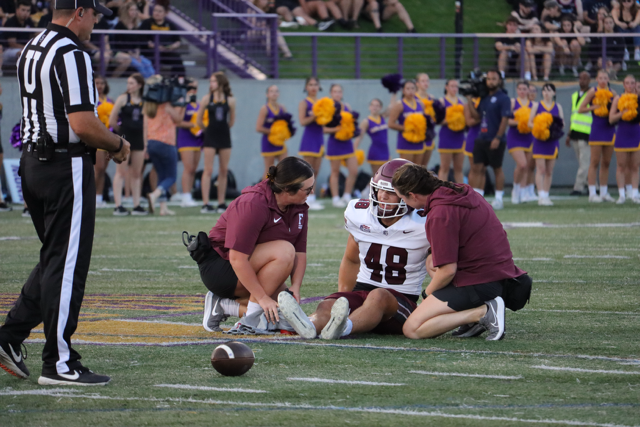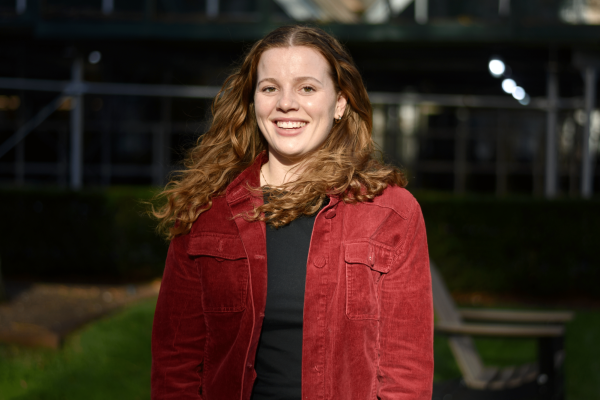Athletic trainers are present in almost every facet of an athlete’s life. They are the people who make sure that everyone is healthy and safe in whatever they are doing.
March is recognized as National Athletic Training Month, a time to celebrate the athletic trainers who work in every part of people’s lives. For the Fordham community, it is a time to thank the nine athletic trainers who work with all 22 NCAA Division I teams at Fordham Athletics.
Kelsy Pacheco, assistant athletic trainer at Fordham University, said her path to becoming an athletic trainer was similar to many others in her field. She said that many athletic trainers choose the profession because it allows them to have a foot in professional athletics and healthcare at the same time.
“I feel like most athletic trainers have a similar ‘origin story’ and mine doesn’t differ much from everyone else’s. I played soccer in high school, sprained my ankle one day, learned we had an athletic trainer and fell in love with the profession.” Pacheco wrote. “From then on I kind of always knew it was going to be athletic training for me- it combined everything I wanted; a way to stay around professional athletes and sports while still getting to be a part of healthcare.”
The athletic trainers at Fordham often work long hours seven days a week to ensure the health of their athletes.
The athletic trainers at Fordham work with the university’s over 500 student-athletes, on recovering physically, from prevention to injury. Women’s basketball head coach Bridgette Mitchell wrote that the Fordham athletic trainers are a vital part of the athletics program.
“Trainers are arguably the most important people when it comes to athletes. Within our program, we don’t just use the training room for injuries, we have our players go there for prevention and maintenance also,” Mitchell wrote.
The athletic trainers at Fordham often work long hours seven days a week to ensure the health of their athletes. The type of work that the athletic trainers do changes from day to day, depending on the status of athletes or the sports they are working with.
However, Fordham’s associate athletic director and head athletic trainer Erin Cameron said that the ever-changing nature of the job is one of her favorite parts.
“There’s never a day that’s the same for me, which I kind of like. There’s all that’s going to happen at a practice or a game that’s going to come your way and you have to think on your toes a little bit,” Cameron said.
For Alyssa Plantz, Fordham’s associate athletic trainer, one of the most important parts of the everyday work that the athletic training department offers to all Fordham athletes is their prevention and maintenance training.
“We always tell our teams, ‘the room is not just for when you’re injured. The room is to prevent injury.’ As an athletic trainer, your goal is to not have anybody in your room, obviously. We offer preventative rehabilitation programs. We like to call them ‘prehab,’” Plantz said.
The “prehab” that Fordham’s athletic trainer offers to the athletes on campus looks like anything from working out sore muscles, figuring out why athletes can lift more with one arm than the other or providing treatments like hydrotherapy to the athletes. Fordham’s athletic trainers are present in most of the athletic days at Fordham.
“We balance our days with enough time in the athletic training room to perform treatments, rehabs, pre-practice prep, post-practice stuff and then we spend a good chunk of our day as well, either out on our field or on our court or at our facility,” Plantz said. “Whatever sport we are working, that day, we spend a good amount of time with that team actually out at their practice, or competition.”
Getting back on the field or into play is often a highly emotional period for an athlete because a part of their identity is put on hold.
One of the biggest tasks Fordham athletic trainers have aside from their daily treatments is getting an injured athlete back to full-time play. After athletes have been assessed for an injury, the athletic trainers are in charge of developing a program that will restore athletes to a place in their physical health where they can return to play. This is often a long process that requires a lot of physical therapy for the athletes, so for Plantz it is important to celebrate the small improvements that are made every day.
“We like to celebrate the little ones. Somebody is just getting off crutches and they’re taking baby steps, like we jump up and down like cheerleaders. We’re so supportive of the little wins because for our profession that’s what you have to celebrate,” Plantz said.
Getting back on the field or into play is often a highly emotional period for an athlete because a part of their identity is put on hold, but as an athletic trainer, Pacheco said she tries to support her athletes’ emotional health as much as she is able to support their physical recovery.
“As much as I would love to carry the burdens that come with injuries for my athletes, I know that I can’t and I’ll never be able to do that. What I can do is listen and help take the load off for a little. Sometimes, they just ask to come in and rant and we’ll just book a treatment session to get everything off our chests… treatment isn’t always hands on,” Pacheco wrote.
“We like to make everyone feel important and like they’re not just here as a chess piece in the game.” Alyssa Plantz, associate athletic trainer
The athletic training room that is in the basement of the historic Rose Hill Gymnasium is not only a space for athletes to recover physically but also a space where they unwind socially. Especially during an injury period, athletes at Fordham see their athletic trainers almost every day. All of Fordham’s athletic directors are trained in mental health first aid, meaning the environment that they cultivate in their training room allows them to be emotional outlets for their student-athletes.
“We have a good relationship with our student athletes just because they’re around them so much. You can have one on one conversations and get to know the athlete on a personal level, in addition to helping them succeed on the field,” Cameron said.
Part of the emotional connection that athletic trainers have with their athletes, is seeing them beyond their student-athlete identities. Plantz highlighted the importance of seeing the athletes who come through the training room as humans first and foremost.
“We like to make everyone feel important and like they’re not just here as a chess piece in the game,” Plantz said. “We’re a friend, we’re a therapist, we’re maybe a big sister or big brother, maybe a mom or dad. Depending on how they view us, athletic trainers at Fordham are super important for athlete life.”
A lot of the work that the athletic trainers do at Fordham is behind the scenes, mainly between them and the athletes they are supporting.
“It’s an underrecognized, underrepresented and under-respected profession. We’re not spotlight people,” Plantz said.
Despite the lack of recognition for the work they do in ensuring the physical and emotional health of the Fordham student-athletes, Plantz said that being able to see her athletes’ accomplishments on and off the field is enough.
“As infrequently as athletic trainers are, you know, thanked and given any sort of credit for the process, it’s enough for most of us just to see our athletes succeed,” Plantz said.


